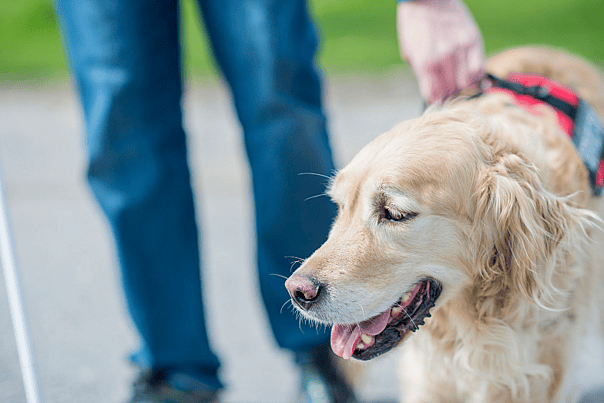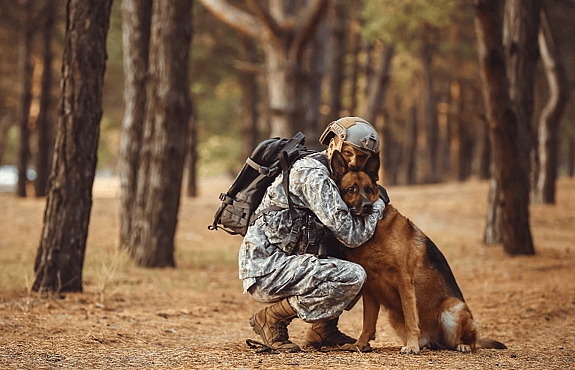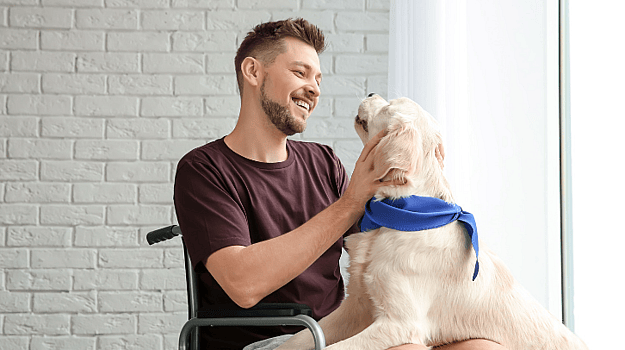11 Places to Get Service Dogs for Veterans
Rocky Kanaka uses his multi-media presence to advocate for animals in need around the world, but his most recent project also has a human focus. In his new short film (featured in the video above), Rocky Kanaka explores the experience of returning military Veterans and their new dogs, highlighting a variety of much needed programs now available around the country.
In these programs, Veterans are paired with rescue dogs who have been carefully selected for their temperament, interest in humans, and ability to pick up on important training. After assessment and preparation with one of the many nonprofits that train military Veteran companion dogs, these rescue dogs are paired with Veterans seeking emotional support and therapy dogs.

For many Veterans, their challenges don’t end when they return home, and in some cases, they only compound.
Though being on active duty is obviously extremely taxing, both the physical and psychological effects of their time away can last long after the conflict itself has ended. Whether it’s an injury that will never heal, trauma they aren’t able to deal with, or simply a feeling of being lost and disconnected, many Veterans come home to a world they no longer feel they have a place in. Unfortunately, so many of our troops don’t get the help they need once they’ve left the front lines, and that needs to change.
Fortunately, efforts are being made to do so through programs that provide service dogs for Veterans. Though help from a therapist or loved one is certainly an important part of the recovery process, the natural bond between a dog and their human has a unique and incredible healing power that has helped so many already.
So, what exactly do service dogs do for Veterans, and how would a Veteran go about adopting one?

Types of Service Dogs
No matter a Veteran’s needs, a service dog can be trained to provide assistance. This applies both to psychological and physical disabilities that a Veteran may suffer from after their service, so when looking to adopt a service dog, they can choose one suited to their unique circumstances.
When most people think of a service dog, a guide dog usually comes to mind. If a Veteran’s vision has been impaired in the line of duty, they may have trouble navigating everyday life as they once did. A guide dog can help mitigate these difficulties by walking ahead of their owner, sniffing out any potential hazards, and providing an alert in potentially dangerous situations.

In some cases, an injury may cause a Veteran to lose their mobility, whether that’s a damaged leg that leaves them with a limp, a lost limb, or something as serious as a spinal injury that prevents movement altogether. Many service dogs are trained as mobility aids and can act as a balancing point for their owners, or even pull a wheelchair in the most severe of cases. In addition, they’ll assist with smaller everyday tasks such as opening doors or bringing items to their owner.

A service dog can also help Veterans suffering from psychological disorders! Service dogs are specifically trained to deal with mental health issues Veterans may suffer from like depression, anxiety, and PTSD.
| Type of Service Dog | Uses | Available To Veterans |
| Allergen Alert Dogs | To detect allergens in food and products for individuals with severe allergies. | Yes, but these dogs may not be eligible for Veteran programs as allergies are not a direct result of time served. |
| Autism Service Dogs | To provide comfort, assistance, and safety to people on the Autism spectrum. | Yes, but these dogs may not be eligible for Veteran programs as Autism is not a direct result of time served. |
| Diabetic Alert Dogs | To detect low and high blood sugar levels. | Yes, but these dogs may not be eligible for Veteran programs as diabetes is not a direct result of time served. |
| Guide Dogs | To guide blind and vision impared individuals to and from destinations and around obstacles, and to perform basic tasks. | Yes. |
| Hearing Dogs | To alert deaf and hearing impaired individuals to specific noises (i.e. doorbells, alarms, intruder noises) | Yes. |
| Mobility Assistance Dogs | To perform everyday tasks, and/or physically support individuals with limited mobility. | Yes. |
| Psychological Service Dogs | To protect, physically support, and emotionally support people with psychological conditions that may disrupt their lives. Psychological service dogs may be trained to manage specific symptoms and needs. | Yes. |
| Seizure Alert Dogs | To alert individuals with seizure disorders (like epilepsy) to the onset of a seizure, and to provide physical assistance/protection during a seizure. This may also include delivering medication, alerting emergency services, and physically moving an individual out of harm’s way. | Yes. |
What’s An Emotional Support Dog?

Though often confused with emotional support dogs, the two are quite different. While an emotional support dog helps their owner just by being there and does not require training, service dogs are taught specific techniques to prevent and ease the effects of mental health crises, making them effective even in emergency situations like panic attacks, flashbacks, seizures, and more.
Those who suffer from these disorders can confirm that it’s extremely difficult to handle things alone, and while it’s no walk in the park, either way, companionship can go a long way towards the healing process.
For example, a Veteran may experience a flashback if a sight, sound, or smell reminds them of their time in the military. Sometimes this can cause severe dissociation, emotional distress, confusion, and even physical lockdown. In their mind, they may be right back in the midst of combat, and naturally, they can’t just snap back to reality.

This is where a service dog can help. Service dogs are taught grounding techniques to use on their owners such as nuzzling or applying deep tissue pressure. Often, these will allow the owner to recover and go on with their day, or get to a safe place where they can request help from a professional.
How to Get a Service Dog as a Veteran
Aside from what a service dog does to help, there’s another question: how do you get one?
If you are a Veteran suffering from issues that warrant a service dog, you’ll need to get an official diagnosis. From there, you can discuss treatment options with your doctor, and decide whether or not a service dog would be a good fit for you. You’ll also be able to discuss other treatments such as medication or counseling, so it’s worth looking into what you have available.

If your doctor determines that a service dog would be helpful in your day-to-day life, you can then discuss what needs your service dog will have to meet, and decide on which type is best suited to those needs. From there, your doctor will submit an application to move forward with adopting a service dog.
Once your application has been received, you’ll be able to talk with a member of the service dog agency to further discuss your needs, as well as what tasks you can expect your service dog to perform. If the agency decides you’re a good candidate for a service dog, then the final decision is up to you. Though a service dog will be an invaluable companion and improve your quality of life, you need to be prepared to take care of them. If you decide that this is the best course of action for you, you’ll move on to the matching stage.

Next, you’ll be paired with a dog that the adoption agency believes will meet your needs, and you’ll have some time to get to know your new buddy.
Though your service dog is already fully trained, most agencies require an additional training period in which you learn the dog’s commands, what certain behaviors mean, and what you can expect from certain situations. In addition, this gives the dog time to get used to your presence and bond with you, ensuring that they’ll be able to fulfill their duties as effectively as possible.
After this training period, you’re ready to take your new best friend home! Your newfound friendship will benefit not only you but the dog as well! Service dogs have an extremely high drive to please their owners, and find a sense of fulfillment in their work.

As for their work, it will greatly improve your quality of life, allowing you to have more freedom, manage your stress, and begin returning to life as it was before you left.
Though readjusting to normal life is no easy process, you can rest assured that your service dog will be right by your side to ease the strain.
Where Do Service Dogs Come From?
In many cases, service dogs are rescue animals, so when you adopt one, you’re not only helping yourself but providing your new dog with a loving home as well.
However, not every dog is fit to be a service dog, and even those who are may not be suited for certain situations. For example, due to the nature of a mobility aid dog’s work, they tend to only be larger breeds.

Adoption agencies that work specifically with Veterans also work with local shelters and rescues to identify dogs that would be a good fit for their training programs. These dogs are transferred to Veteran-specific adoption agencies where they are given specific training to become service dogs for retired Veterans.
A dog’s ability to become a service dog is largely determined by its temperament. If a dog is innately hyper, stubborn, or inattentive, it won’t be able to effectively carry out the tasks expected of it as a service dog.
As such, highly intelligent dogs who understand the difference between work time and playtime are the ideal candidates, being able to grasp commands quickly and understand situations in which it is and isn’t appropriate to relax.
Groups That Provide Service Dogs For Veterans
With the rise in popularity of service dogs as a support tool for Veterans, many adoption agencies have popped up around the country. Thankfully, this makes it much easier to find one that services your area, allowing you to be paired with a service dog much more quickly. To get you started, here’s a table of a few service dog provider groups for Veterans.
| Group Name | Area | Group Description |
| Shelter to Soldier | Based in San Diego, California | An adoption agency that aims to pair post-9/11 combat Veterans with service dogs to aid the recovery process. |
| Vanderpump Dogs | Based in Los Angeles, California | Though it began as an agency to rescue dogs from the Yulin Dog Meat Festival, it has since expanded, and now includes a program to pair Veterans with service dogs. |
| K9s For Warriors | Five locations, with three in Florida, and one each in Texas and Arizona. | Founded to fight the extremely high Veteran suicide rate and give our soldiers the honor they deserve, K9s For Warriors has since grown into the largest provider of service dogs for Veterans in the United States. |
| Medical Mutts | Based in Indianapolis, Indiana | Medical Mutts was founded to train service dogs. If you want to look into training your own dog, this organization provides the resources to do so. |
| Pets For Vets | 11 locations, based in Massachusetts, Main, Pennsylvania, Delaware, North Carolina, Georgia, Idaho, Ohio, Illinois, Wisconsin, and Indiana. | Founded to both combat high euthanization rates of shelter dogs and provide treatment for returning Veterans, this organization has given both a new lease on life. |
| Service Dog Express | Seven locations in Texas, two in New Mexico, and one each in Florida, New Jersey, Oklahoma, Oregon, and Tennessee. | Founded to combat the issues faced by larger rescue groups by reducing costs and wait time while increasing the amount of time clients have to bond with their service dog. |
| Pawsitivity Service Dogs | Based in St. Paul, Minnesota. | A nonprofit service dog agency founded with transparency in mind, Pawsitivity has since grown into something much greater, saving the lives of dogs and Veterans alike. |
| Semper K9 | Based in Quantico, Virginia | Founded by a Veteran, this group works to make service dogs more accessible to US Veterans by providing them free of charge. |
| Puppies Behind Bars | Based in New York, New York | This organization provides Veterans with service dogs trained in prison, simultaneously giving a second chance to Veterans, rescue dogs, and the incarcerated. |
| Canine Companions | Six training centers, with two in California and one each in Texas, Florida, Ohio, and New York. | Rising PTSD rates in Veterans spurred Canine Companions to begin a Veteran program, which provides disabled Veterans with service dogs at no expense. |
| NEADS | Based in Princeton, Massachusetts. | This charity’s Veteran program provides service dogs to all disabled Veterans, whether or not their disability is a result of their service. |
| Vets Adopt Pets | N/A | A directory of service dog adoption agencies with Veteran programs. |
| Operation We Are Here | N/A | A directory of service dog adoption agencies with Veteran programs, as well as other relevant information for Veterans looking into getting a service dog. |
Serving the country is a difficult job that few are able to perform, and even fewer are willing. That’s why we believe our Veterans deserve nothing but the utmost respect, as well as ready access to the resources they need to reintegrate into everyday life. Furthermore, we believe that the special bond between humans and dogs is one of the most incredible treatments out there and that every Veteran who needs a service dog should be able to have one.




